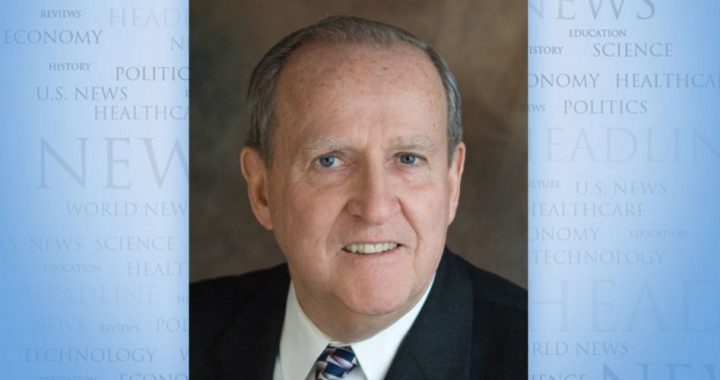
If your schedule calls for a trip to our nation’s capital, you can now visit a new memorial located along Independence Avenue near the U.S. Capitol. Erected at a cost of $150 million, it pays tribute to former President Dwight Eisenhower, the hastily appointed U.S. Army general, and subsequent U.S. president, who commanded U.S. forces during the European portion of World War II. His presidency began in 1953, and he served two full terms until 1961.
Early in the first year of Eisenhower’s time in office, businessman Robert Welch shocked some acquaintances with some disturbing history of the man widely known as “Ike.” They asked Welch to put his information in writing so they could study it, share it with a few selected others, and even attempt to disprove what they had been told. Welch did as requested and continued for several more years to add to what he had already compiled. In time, he shared his 300-page review of Ike’s career with a small number of acquaintances who were asked to refrain from passing it around and then send it back to him after reading it.
Skipping ahead to 1958, Welch and 11 of his closest friends launched The John Birch Society, the patriotic organization whose chosen task was to put an end to the steadily increasing and even frightening control by pro-communists in the American government, the mass media, and numerous divisions of the country’s life and activity. The men who formed this society were among those who had read Welch’s eventual booksized manuscript. They saw no reason to doubt that Welch was correct in his explosive assessment of the sitting president, and they were eager to do something about the situation. Welch’s Birch Society wasn’t built around his thesis about Eisenhower, however. His organization was anti-communist and anti-socialist to be sure. But it was also solidly pro-American, included a scholarly recounting of some world history, and provided a plan to do something about the slide into tyranny that had already achieved startling progress.
One copy of his 300-page treatise about Ike wasn’t returned as requested. It ended up in the hands of a Chicage newspaperman who wrote a small article about its contents wherein he cited Welch’s suggestion that all of the carefully compiled information about Ike had led to several possible conclusions, one of which was that, during his years in the military and even while serving as our nation’s president, Eisenhower had betrayed his country to the communist enemy and might himself even been a secret communist.
Eventually, Welch published his manuscript. He did so because the fast-growing John Birch Society was being unmercifully attacked using the single possible conclusion about Eisenhower. After announcing to the world that his manuscript was now available for anyone to read, critics of the anti-communist Birch Society carefully chose to repeat the possible conclusion Welch had offered but they refused to let the American people know that his 300-page book with 150 pages of added documentation was now available.
The story about the way Welch’s critics carefully avoided providing even a hint that The Politician could now be obtained by anyone amounted to a coverup of Ike’s damaging career. Nevertheless, approximately 600,000 copies of the book were purchased and read by inquisitive Amercans. After doing so, the information they now had encouraged many to sign on with The John Birch Society.
Space allows only a brief sampling of Eisenhower’s misdeeds, each of which advanced Communism’s increasingly frightening grip. Soon after World War II fighting ended, for instance, while Ike was still serving as commander of forces in Europe, he ordered the forcible repatriation to Soviet tyranny of more than two million refugees who had fled Stalin’s control. Ordered to board trains preparing to bring these hapless individuals to certain death or imprisonment, many committed suicide and others had to be prodded to board the trains at gunpoint. Operation Keelhaul was the name given to the unconscionable deed, and all of it was traceable to Eisenhower.
In 1956, Ike was now president. In Hungary, thousands of brave citizens rose up and seized control of Budapest from their Soviet conquerers. They did so after being prompted by America’s Radio Free Europe whose promises of immediate military aid had repeatedly been made. Spanish authorities sought to respond to the plea and promptly gained refueling capability for their aircraft from Germany’s leaders. However, Eisenhower personally forced the German government to cancel their needed assistance, and the help from Spain never got to Hungary. The anti-communist revolt soon ended, and 50,000 who had participated were rounded up and executed by Soviet forces
Fidel Castro gained control of Cuba early in 1959. Several years before the communist takeover, two American ambassadors stationed within the island nation, had warned Washington that Castro was a dangerous communist. Each was replaced and told to return to the United States and keep quiet about they had discovered. The Eisenhower administration proceeded to cut off miltary aid shipments to the Cuban government whose leaders discovered that arms were being delivered to the communist insurgents courtesy of American leaders. Castro and his criminal band took over Cuba and were immediately given diplomatic recognition by the Eisenhower administration. The communists controlling Cuba proceeded to round up and execute anti-communist Cubans who tried to resist Castro’s takeover. Sixty years later, Cuba remains under communist control.
Eventually, President Eisenhower’s own book Crusade in Europe provided a glowing tribute to his military career and later rise to prominence as a politician. What wasn’t revealed is that the entire book was ghost-written for the president by an actual communist named Joseph Fels Barnes.
Obviously, there is a great deal more about Dwight David Eisenhower in The Politician’s 300 pages. Robert Welch’s compelling history tells the true story about the man who is now honored with a memorial in Washington. Anyone who cares to read this book will find it available from The John Birch Society. Skeptics of what we have noted above should beware however. The truth compiled in those pages about Eisenhower cannot be denied. Anyone finding himself in Washington might want to skip visiting the new memorial and find something better to do with some precious time.



